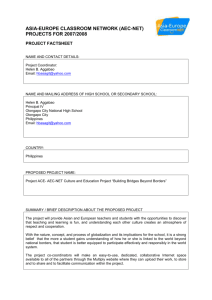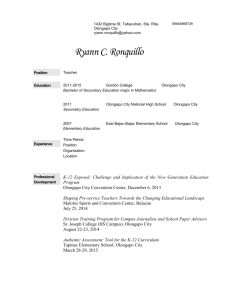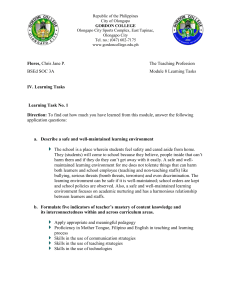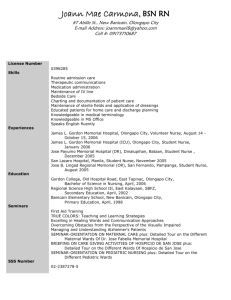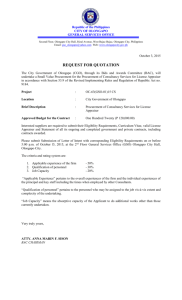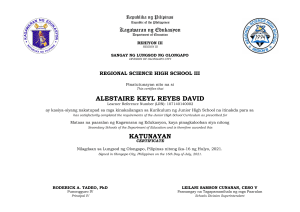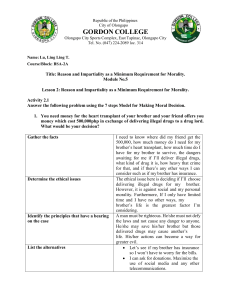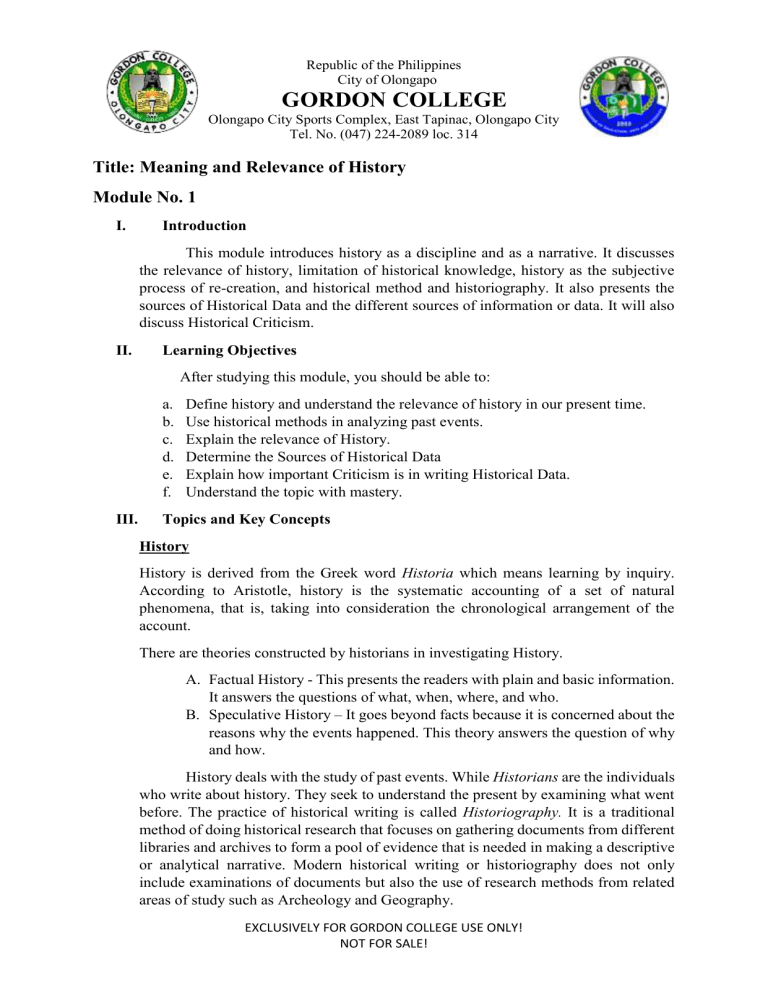
Republic of the Philippines City of Olongapo GORDON COLLEGE Olongapo City Sports Complex, East Tapinac, Olongapo City Tel. No. (047) 224-2089 loc. 314 Title: Meaning and Relevance of History Module No. 1 I. Introduction This module introduces history as a discipline and as a narrative. It discusses the relevance of history, limitation of historical knowledge, history as the subjective process of re-creation, and historical method and historiography. It also presents the sources of Historical Data and the different sources of information or data. It will also discuss Historical Criticism. II. Learning Objectives After studying this module, you should be able to: a. b. c. d. e. f. III. Define history and understand the relevance of history in our present time. Use historical methods in analyzing past events. Explain the relevance of History. Determine the Sources of Historical Data Explain how important Criticism is in writing Historical Data. Understand the topic with mastery. Topics and Key Concepts History History is derived from the Greek word Historia which means learning by inquiry. According to Aristotle, history is the systematic accounting of a set of natural phenomena, that is, taking into consideration the chronological arrangement of the account. There are theories constructed by historians in investigating History. A. Factual History - This presents the readers with plain and basic information. It answers the questions of what, when, where, and who. B. Speculative History – It goes beyond facts because it is concerned about the reasons why the events happened. This theory answers the question of why and how. History deals with the study of past events. While Historians are the individuals who write about history. They seek to understand the present by examining what went before. The practice of historical writing is called Historiography. It is a traditional method of doing historical research that focuses on gathering documents from different libraries and archives to form a pool of evidence that is needed in making a descriptive or analytical narrative. Modern historical writing or historiography does not only include examinations of documents but also the use of research methods from related areas of study such as Archeology and Geography. EXCLUSIVELY FOR GORDON COLLEGE USE ONLY! NOT FOR SALE! Republic of the Philippines City of Olongapo GORDON COLLEGE Olongapo City Sports Complex, East Tapinac, Olongapo City Tel. No. (047) 224-2089 loc. 314 Question: Does History has its limitation? Yes or no? The incompleteness of records has limited man’s knowledge of history. Most human affairs happen without leaving any evidence or records. If there are, there is no further evidence of the human setting in which to place surviving artifacts. With this, the past has perished forever with only an occasional trace. Now, Let’s go back to the question does History has a limitation? The answer is No, our History doesn’t have a limitation but rather our Historical Knowledge. Why? As mentioned earlier, the incompleteness of records limited our knowledge of history. This means that there are events that happened that we aren’t sure if it really happened because it has no surviving records. And because of that historians called those events as History as Actuality. This, History as Actuality refers to the whole history that happened in the past. On the other hand, History as Record is the events that happened with a surviving artifact and any other proof from the past. Historians tell history from what they understood as a credible part of the record, however, their claims may remain variable as there can be historical records that could be discovered. That explains the Incompleteness of the Object of the historian’s study. History as the Subjective Process of re-creation Because of the incomplete evidence, historians strive to restore the total past of mankind. History becomes only that part of the human past that can be meaningfully reconstructed from the available records and from inferences regarding their setting. Therefore, historians aim for Verisimilitude: Truth, Authenticity, and Plausibility. Historical records therefore should contain verisimilitude. Historical Method and Historiography The historical Method is the process of Critically examining and analyzing the records and survivals of the past. While Historiography is the imaginative reconstruction of the past from the data derived. By this, historians endeavor to reconstruct as much of the past of mankind. The most important element of the Historical Method is called Historical Analysis. There are four steps of Historical analysis: A. B. C. D. Select the subject to investigate Collect probable sources Examine the Sources genuinely Extract credible particulars. Why study History? Does it Benefit our present time? To answer that question let us watch the video on YouTube. Entitled What is History for? Click the Link: https://www.youtube.com/watch?v=hLE-5ElGlPM EXCLUSIVELY FOR GORDON COLLEGE USE ONLY! NOT FOR SALE! Republic of the Philippines City of Olongapo GORDON COLLEGE Olongapo City Sports Complex, East Tapinac, Olongapo City Tel. No. (047) 224-2089 loc. 314 Historical Data Historical data is the data collected about past events and circumstances that pertain to a particular subject. These are sourced from artifacts that have been left in the past. These artifacts can either be relics or remains, or the testimonies of witnesses of the past. These are also the materials from which historians construct meaning. There are two types of Sources in History. A. Written Sources – These are sources that are usually in written form. It has three categories a. Narrative or Literature – These sources are chronicles or tracts presented in a narrative form, it tells a story or narrates the story of the events. E.g Diary, newspaper, etc. b. Diplomatic Sources – are understood to be those documents/records of an existing legal situation or create a new one. This source is also called legal documents. Eg. Laws, Memorandums, Executive orders, etc c. Social Documents – This is information pertaining to economic, social, political, or judicial significance. E.g Research findings, Records of the census, civil registry, etc. B. Non-Written Sources – Sources that are not in written form. a. Material Evidence – this is also known as archeological evidence. These artifacts can tell a great deal about the ways of life people in the past, and their culture. E.g swords, relics, bones, etc. b. Oral Evidence – sources that are transmitted orally. Eg. Tales, folk songs, interviews. Etc. There are two general kinds of Historical sources. A. Primary Sources – are original sources, the first-hand information. The firsthand account of an event or period that is usually written or made during/close to the event or period. Eg. Diaries, journals, maps, speeches, etc. B. Secondary Sources – These are materials made by people long after the events being described had taken place to provide valuable interpretations of historical events. These are interpreted information also known as second-hand information. Eg Research papers, Articles, Editorials, etc. EXCLUSIVELY FOR GORDON COLLEGE USE ONLY! NOT FOR SALE! Republic of the Philippines City of Olongapo GORDON COLLEGE Olongapo City Sports Complex, East Tapinac, Olongapo City Tel. No. (047) 224-2089 loc. 314 Historical Criticisms Many documents have primary and secondary segments. For instance, examining a newspaper as a historical source entails a discerning mind to identify its primary and secondary components. A news item written by a witness of an event is considered as a primary source, while a feature article is usually considered as secondary material. Similarly, a book published a long time ago does not necessarily render it as a primary source. It requires reading the document to know its origin. To ascertain the authenticity and reliability of primary sources to be used in crafting a narrative, a historian needs to employ two levels of historical criticism, namely external criticism, and internal criticism. a. External criticism – answers concerns and questions pertinent to the authenticity of a historical source by identifying who composed the historical material, locating when and where the historical material was produced and establishing the material’s evidential value b. Internal criticism – deals with the credibility and reliability of the content of a given historical source. It focuses on understanding the substances and message that the historical material wants to convey by examining how the author framed the intent and meaning of the composed material. IV. Teaching and Learning Materials and Resources Notebooks, Pen, Speaker, Laptop / Cellphone, and Internet/Data. V. Learning Task A. Create a mnemonic for the word history based on what you learned from this module and write your own definition of it based on your learnings. H I S T O R Y EXCLUSIVELY FOR GORDON COLLEGE USE ONLY! NOT FOR SALE! Republic of the Philippines City of Olongapo GORDON COLLEGE Olongapo City Sports Complex, East Tapinac, Olongapo City Tel. No. (047) 224-2089 loc. 314 Quiz. A. Answer the following questions and write the answer before the number. 1. The practice of Historical Writing. 2. The Greek word for History. 3. The meaning of the Greek word History. 4. 5. Three Aims of Verisimilitude. 6. 7. History that presents the readers with plain and basic information 8. History that goes beyond facts 9. The process of critically examining and analyzing the records of the past. 10. Who are the writers of history? 11. 12. The Four steps of 13. Historical Analysis 14. 15. The reason why historical knowledge has limitations. B. Identify the following if it is written or not-written. Put a Circle O if it's a Primary source, and put a square if it is a Secondary Source. 1. Journal 2. Bible 3. Flag 4. Relics 5. Bones 6. Books 7. Wheel 8. Biography 9. Auto Biography 10. Songs EXCLUSIVELY FOR GORDON COLLEGE USE ONLY! NOT FOR SALE! Republic of the Philippines City of Olongapo GORDON COLLEGE Olongapo City Sports Complex, East Tapinac, Olongapo City Tel. No. (047) 224-2089 loc. 314 C. Essay. 1. Does criticism help the historical data in preserving the authenticity of the information? Yes or no? Why and How? (5pts) 2. Explain the statement (5pts) “People who don’t know history tend to repeat the mistakes of the Past” VI. Reference Ligan, et al., (2018). Readings in the Philippine History, Mutya Publishing, Inc. The School of life. (2014, Oct 31). What is history for? [Video]. Youtube. https://www.youtube.com/watch?v=hLE-5ElGlPM Reflection part What are your reflections on this module? EXCLUSIVELY FOR GORDON COLLEGE USE ONLY! NOT FOR SALE!
